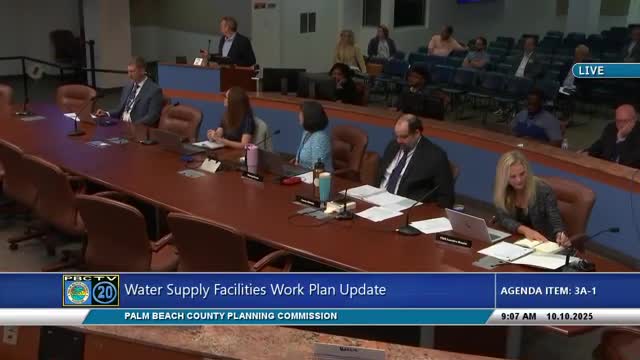Planning commission accepts Palm Beach County water-supply work plan update
October 10, 2025 | Palm Beach County, Florida
This article was created by AI summarizing key points discussed. AI makes mistakes, so for full details and context, please refer to the video of the full meeting. Please report any errors so we can fix them. Report an error »

The Palm Beach County Planning Commission accepted a county-initiated update to the Water Supply Facilities Work Plan and related comprehensive-plan edits after a staff presentation and a brief round of commissioner comments.
The update, presented by David Willock of the Planning Division and staff from Palm Beach County Water Utilities, revises population and demand projections and adopts the county’s 10-year water supply facilities work plan by reference in the utility element. Staff told the commission the update was prepared to conform with the Lower East Coast Water Supply Plan (South Florida Water Management District, Sept. 2024) and the update required under section 373.709, Florida Statutes, and recommended approval.
The work plan projects countywide demand through the 2035 planning horizon and updates tables in the utility and capital improvement elements to reflect revised demand and capacity numbers. Water Utilities staff said the department serves roughly 40 percent of the county today and expects that share to remain about the same through 2035. Staff presented region-specific per-capita figures of about 103 gallons per person per day for the county’s Eastern service area and about 176 gallons per person per day in the Western service area. Staff also summarized raw-water and treatment capacities, noting about 100 wells serving the surficial aquifer and an approximate 135 million gallons per day (MGD) raw-water figure for the eastern system and about a 10 MGD reverse-osmosis capacity for the Western region.
The department described current and proposed alternative-water-source projects. Staff highlighted the South County Reclaimed Water Project, a partnership with Broward County designed to supply roughly 7 MGD to the southern service area (target construction start noted around 2028), and the Green K Phase 2 project, a 2 MGD project that would treat reclaimed water to drinking-water standards and use it to recharge lakes and the aquifer.
Commissioners and visiting officials praised the presentation and the utility’s operations; questions focused on emergency interconnects and how bulk water agreements with municipalities work. Water Utilities staff listed eight standing bulk-water agreements and described emergency interconnect arrangements the county maintains with neighboring utilities.
After discussion, a commissioner moved to accept the agenda item “as submitted”; a second was recorded and the motion passed on a roll call vote. Staff indicated no inconsistency with the comprehensive plan and recommended initiation of the comp-plan amendment and adoption of the county work plan by reference.
The planning commission’s action forwards the update and related map/table corrections for subsequent phase-two processing and final public hearings required by the county’s comprehensive-plan amendment process.
The update, presented by David Willock of the Planning Division and staff from Palm Beach County Water Utilities, revises population and demand projections and adopts the county’s 10-year water supply facilities work plan by reference in the utility element. Staff told the commission the update was prepared to conform with the Lower East Coast Water Supply Plan (South Florida Water Management District, Sept. 2024) and the update required under section 373.709, Florida Statutes, and recommended approval.
The work plan projects countywide demand through the 2035 planning horizon and updates tables in the utility and capital improvement elements to reflect revised demand and capacity numbers. Water Utilities staff said the department serves roughly 40 percent of the county today and expects that share to remain about the same through 2035. Staff presented region-specific per-capita figures of about 103 gallons per person per day for the county’s Eastern service area and about 176 gallons per person per day in the Western service area. Staff also summarized raw-water and treatment capacities, noting about 100 wells serving the surficial aquifer and an approximate 135 million gallons per day (MGD) raw-water figure for the eastern system and about a 10 MGD reverse-osmosis capacity for the Western region.
The department described current and proposed alternative-water-source projects. Staff highlighted the South County Reclaimed Water Project, a partnership with Broward County designed to supply roughly 7 MGD to the southern service area (target construction start noted around 2028), and the Green K Phase 2 project, a 2 MGD project that would treat reclaimed water to drinking-water standards and use it to recharge lakes and the aquifer.
Commissioners and visiting officials praised the presentation and the utility’s operations; questions focused on emergency interconnects and how bulk water agreements with municipalities work. Water Utilities staff listed eight standing bulk-water agreements and described emergency interconnect arrangements the county maintains with neighboring utilities.
After discussion, a commissioner moved to accept the agenda item “as submitted”; a second was recorded and the motion passed on a roll call vote. Staff indicated no inconsistency with the comprehensive plan and recommended initiation of the comp-plan amendment and adoption of the county work plan by reference.
The planning commission’s action forwards the update and related map/table corrections for subsequent phase-two processing and final public hearings required by the county’s comprehensive-plan amendment process.
View full meeting
This article is based on a recent meeting—watch the full video and explore the complete transcript for deeper insights into the discussion.
View full meeting